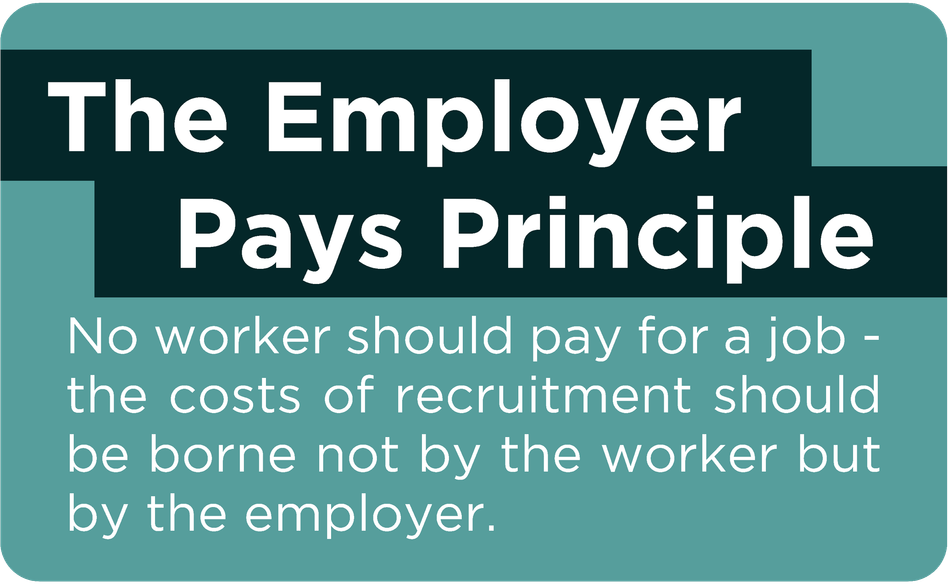What are employment and recruitment agencies?
25 June 2024

Businesses operating in all sectors and all locations may use the services of employment and recruitment agencies to find staff. Employment and recruitment agencies provide a vital service to businesses and jobseekers. For many workers, they provide a route into full or part time employment. Like all other businesses, employment and recruitment agencies have human rights responsibilities. How workers are recruited and employed impacts their rights. Lack of respect for workers’ rights, especially for migrant workers, makes them vulnerable to exploitation. A critical dimension of such treatment involves the payment of recruitment fees.
Beyond recruitment fees, employment and recruitment agencies also face a broad range of human rights risks they must be aware of. From gender related discrimination, wage theft, decent pay, and unsafe working conditions to non-retention of passports/documents etc.
For more examples on the responsibilities and risks, read IHRB's Employment and Recruitment Agencies Sector Guide on Implementing the UN Guiding Principles on Business and Human Rights.
In 2020 the Global Private Employment Services Industry generated an estimated $532 billion.
Who are the stakeholders in the employment and recruitment agency sector?
There are many different terms used to describe actors in the global recruitment industry.
Workers may be referred to as agency staff, contingent workers, temporary workers, some may be foreign workers and migrant workers.
Employment and Recruitment Companies managing the employment and recruitment of workers may be referred to as employment agencies, labour agents, gangmasters, labour brokers, recruitment agents and many more.
Sometimes, these terms for workers and agencies are used interchangeably but can mean very different things. The shorthand term used by many stakeholders to describe the sector is E&R agencies.
What is the difference between an employment agency and a recruitment agency?
In an employment agency model, the worker is an employee of the agency and has no contractual relationship with the business where they are working.
In a recruitment agency model, the agency simply organises the recruitment of the worker who is then employed by the business.
These are the 2 most basic models but agencies will sometimes also offer a range of additional services.
Some larger E&R agencies have become major international companies offering a range of employment, recruitment and other human resources services to business clients.

What are the National Associations of E&R agencies?
Many E&R agencies will join a national association - a trade body who provides a range of services to members.
The association will also usually represent the industry in engaging with other sectors and with government authorities.
Most associations have a Code of Conduct for their members to establish high standards and expected professional practice.
Individual E&R agencies may choose to join their national association. In some countries, admission to the national association is automatic on being granted an agency licence to operate. In others, associations have to recruit members to join them.
National associations may in turn become affiliated to the World Employment Confederation (WEC).
The largest international agencies may also become affiliates of the WEC as corporate members. The World Employment Confederation is the international body representing the industry on the global stage. However, there are many agencies who remain unaffiliated.
Recruitment agencies and recruitment fees
Many workers in countries around the world seeking employment abroad will use the services of recruitment agencies to secure work. A common practice in some recruitment corridors is to charge recruitment fees for this service. This practice may be perfectly legal, and in some countries the amount of fees that may be charged to workers is capped. However, any recruitment charges to workers may leave workers in debt and vulnerable to further exploitation. Often these workers are employed in the direct operations or supply chains of international brands. This business model of workers paying the costs of their own recruitment is increasingly facing challenge. Civil society, business and governments have been promoting a recruitment model where workers are not expected to pay recruitment costs. Some governments such as the USA have prevented access to their markets for goods produced by companies whose workers have been charged recruitment fees. Similar sanctions are likely to follow in Europe to align with new EU due diligence legislation and Forced Labour Regulations.
Recruitment is a business cost and should be paid by business.
Tracking responsible recruitment
IHRB’s Responsible Recruitment Register showcases and tracks the number of companies adopting policies that prohibit workers being charged these fees and costs for recruitment.
Companies and some recruitment agencies are increasingly committing to The Employer Pays Principle. In some markets, it is difficult for responsible recruitment agencies to compete with agencies that charge fees to workers and are therefore able to offer low cost or no cost services to businesses.

Defining recruitment fees
What constitutes recruitment fees, costs and related charges was for many years the subject of some debate.
In 2019, the ILO brought together a range of stakeholders to agree on a common definition. Although non-binding, this definition has become a common standard to which many organisations adhere.
Private Employment Agencies Convention 181
This ILO Convention safeguards the rights of both E&R agencies and workers using their services. In particular, Article 7 of the convention notes:
'Private employment agencies shall not charge directly or indirectly, in whole or in part, any fees or costs to workers.'
The World Employment Confederation supports ILO Convention 181, meaning its members and affiliates should not charge recruitment costs to workers but instead align with the Employer Pays Principle and so take their profit from the company requiring staff.
This means some national associations where fee charging to workers remains the norm are not eligible to join WEC.
Licensing of E&R agencies
In many countries agencies require a government licence to operate. Some licensing regimes are comprehensive and serve to ensure ethical practice. However, licensing legislation, oversight and enforcement continues to be less rigorous in many locations. In countries where charging recruitment fees to workers is the normal business model, using a licensed broker is no guarantee of ethical practice or that workers will not be charged recruitment fees.
The Montreal Recommendations on Recruitment - A Roadmap towards Better Regulation
The Montreal Recommendations were developed in 2019 at a global conference convened by the International Organisation for Migration (IOM). The conference brought together regulators and policymakers from over 30 countries, including leading experts and practitioners from ministries of Labour, Foreign Affairs and Immigration, supported by experts from international and regional organisations, including IOM, the International Labour Organization (ILO) and the Organization for Security and Cooperation in Europe (OSCE). Through two days of presentations, round-table discussions and break-out sessions, participants articulated recommendations to improve the regulation of international recruitment in nine areas:
- Protecting migrant workers;
- Recruitment fees;
- Registration and licensing;
- Administration, inspections and enforcement;
- Ratings, rewards and rankings;
- Access to grievance mechanisms and dispute resolution;
- Bilateral, regional and multilateral mechanisms;
- Migrant welfare and assistance; and
- Maintaining momentum on regulation.
The 55 recommendations they developed are consistent with international human rights and labour standards.
They provide diverse, practical guidance to governments to enable more effective regulation of international recruitment and protection of migrant workers.


